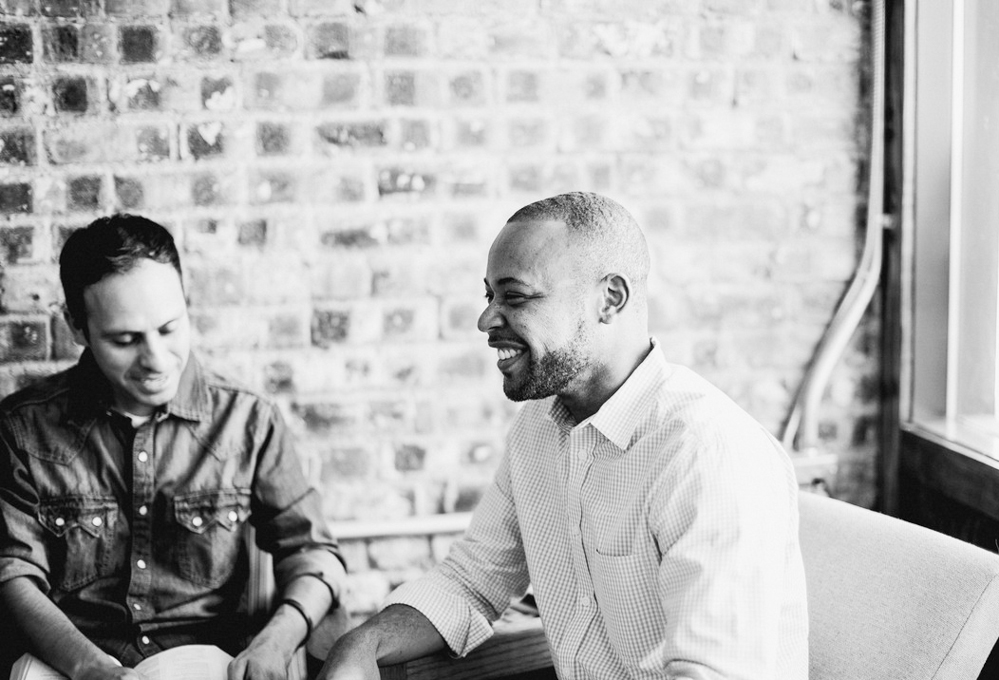|
Stop.
Don't do whatever you were going to do next. Close your eyes and center yourself. Breathe easily. Stay like that for as long as you want. Forget time. Don't worry, you won't be here long. There will be a point when your mind will call you out of this short reverie. That's when you'll want to do the next thing. That's when you'll truly be ready to do it. When you want to. Not because it's the next thing to do. Not because you were looking for something to occupy your time. Not out of a nervous habit to keep going. Wait for originality, creativity, ingenuity to strike you. Claude Debussy said: "music is the space between the notes." Stopping allows you to create the space for your music to enter. Otherwise, you just keep playing without taking a breath. Try this now. Collect yourself before you do the next thing, so you act as a whole person. Not partially attentive, but fully there. Based on the number of direct emails I got on my last post, I'm closing comments and asking that you email me your thoughts. I've found the dialog to be very rich this way, and hope you do too. "It's supposed to be here!" It's 5:30, and the bus scheduled for 5:20 still hasn't arrived. I keep looking for it every time I see another bus turning the corner. And every time I do, I feel more frustrated.
It's silly really because the bus is going to come when it comes. I have no control over its arrival whatsoever. What I do have control over though is micro-waiting, this short, inconsequential period of time (~10 minutes) that may ruin my mood for the next few hours. You can even see this kind of micro-waiting in other people just by looking at the angle of their bodies. Most people will be facing the direction the bus will come from. Even though it will stop right in front of them, they still want to see it before it does. The hope, the anticipation, even the worry is displayed in their body language. I see a speech bubble above their heads yelling, "Why isn't is here yet!?" Waiting patiently doesn't come easy for most of us. It's a struggle because we want control. Our whole day is scheduled because of meetings and deadlines. There are strong expectations to start and end on time, to keep moving onto the next task. That thing called work, where we create something - produce a media kit, write a business case, design an email campaign, coordinate an agenda, draft a presentation, brainstorm titles, work on the budget - is packed in whenever we can get to it. Little breathing room is afforded to let time just be. To let ourselves flow with the work, in a rhythm that fits our mood, our creative desires, our energy, and our passion. That cautious care for the thing we're producing that lets us feel like we're making art, not just checking off another item on our to-do list. Here's how Eckhart Tolle puts it in The Power of Now: "If you set yourself a goal and work toward it, you are using clock time...If you then become excessively focused on the goal, perhaps because you are seeking happiness, fulfillment, or a more complete sense of self in it, the Now is no longer honored. It becomes reduced to a mere stepping stone to the future, with no intrinsic value. Clock time then turns into psychological time. Your life's journey is no longer an adventure, just an obsessive need to arrive, to attain, to 'make it.'" And so we end our day waiting for a bus, a subway, or in traffic and we can't let go of what Eckhart Tolle refers to as "psychological time." Besides, the process of anticipating gives us something to do. The mode of "getting things done," which we just got done with at work, still runs strong in our psyche and anticipation and worry are "actions" of sorts that make us feel like we can will the impossible (the bus' arrival) into being. What is far easier, and far more peaceful, is to remind ourselves that time doesn't wait for us. That bus will come of its own accord. The traffic will move when it does. Accept what is. Observe and pay attention to what is truly happening, not what you want to happen. Allow me to narrate the "waiting for the bus" scenario as I have done for myself many times before, with the mentality of acceptance, not anticipation: "I'm done with work. I am outside, breathing in the fresh air. My body is slowly letting go of the tensions of the day. There are other people around me looking forward to their evening. Moms and dads meeting up with their kids after picking them up from day care. Bikers, pedestrians, cars navigating the road. Buses coming and going. And me standing here just looking at the milieu. Oh, there's my bus!" I'm just there. Not doing, but rather being, in the moment as things happen. It's truly as simple as that. This is how patience emerges to melt away all the micro-waiting anxiety that can build up in mere moments and cause us and others mental strife for hours. This letting go and transitioning takes practice, and luckily each moment that we wait offers an opportunity to do just that. To try out methods of being patient. It's a mental shift from reacting impatiently to something we can't control to responding attentively to what's before us. This has real life consequences, since that transition from work to home (or vice versa) truly affects how we interact with those we'll be with shortly. Do we come in with the baggage of the day? Do we pay attention to what is happening to our partners, kids, friends, or colleagues? Can we attend to ourselves and what we need in the transition? Attention has lasting effects that stay with us moment to moment. What makes you impatient? How do you handle it? Please comment on this post or simply email me. How do you avoid losing your mind during a busy week? There is so much going on, it can be easy to lose control of time and priorities.
The constant stress of your phone buzzing you about another meeting, text, tweet, or phone call. The anticipation of presenting what you've been working on to your colleagues or bosses. Traveling off site to a client's office or a conference, wondering whether there's going to be parking, or if they'll have coffee or should you get it beforehand. That's just work. Then, there's your personal life bleeding into your day. The reminder to pick up your dry cleaning, move money to another account, get a birthday card for a friend, set your alarm to leave early the next day, call your doctor's office to renew your prescription, read the bios of the people at tomorrow's networking event. And no to-do list item stands alone, rather it has multiple parts to it that vie for your limited attention. I had one of these weeks not too long ago and what resonated with me was the mindful approach of "naming meditation." I don't mean formal meditation, where you sit on a cushion in a quiet room for 20 minutes. I mean that as the day passes, you start naming different parts of it "busy", "necessary", "essential", "boring" or whatever word best fits the situation. The "naming" separates you from the experience for a brief moment so you can observe it objectively. You're still doing the work, talking in a meeting, listening attentively, but you're removed from all the ego-based thinking: "This is too much for me," "Why do I have to sit through this?" "I have so much work to do!" That kind of "stinking thinking," as one of my clients calls it, gets absorbed in the name you've given to the situation. Here's how it works:
All of this will take 30-60 seconds in your mind, perhaps longer in the beginning simply because you're practicing the method. You will now be separate from that which has been taking control of you. You will be able to point to it in your mind and know it for what it is, and what it may continue to be, and go back to what you were doing. The quote that comes to mind to best describe this is: "Detachment is not that you should own nothing, but that nothing should own you" — Ali ibn abi Talib If you're saying to yourself, "Isn't the naming itself judgmental?", then take a second and think about the thoughts and perceptions that are getting the better of you. The thoughts are already judgments of the experience you're having. "Naming" is just a way to recognize the judgmental thinking, call it out in a single word, and go back to the task at hand. Try this out and leave a comment or email me about your experience! I'm curious about how it works for you personally. Peace, Akshay Conscious Magazine has been kind enough to allow me to continue posting articles on how mindfulness can empower social entrepreneurs in their work.
Below is an excerpt from my latest article: "Hands-on experience is hard to come by when information is ubiquitous and cheap. It’s too tempting to keyword search your audience. Too easy to pull up competitor websites, buy market data, read conference reports, or run a lit review. Defining who your audience is with these facts and figures is like putting together a jigsaw puzzle with pieces of information that come second-hand from another person's experience. You're a journalist before you're an entrepreneur..." Read the full Conscious article here. "Sometimes I sits and thinks, and sometimes I just sits." --Satchel Paige Self-Reflection Made Easy
The most long-lasting and powerful way to develop deep personal insights is through self-reflection, finding quiet time you can set aside to think or just be for a few minutes. This is easier said than done in our fast-paced, information-heavy, overly-busy modern world. Why would you spend valuable time doing nothing? Here are a few reasons:
Down time is incredible, but difficult for many to incorporate into their lives. And though I'm being light-hearted, I'm very serious about how it can improve your day-to-day life. This is why I want to make it easier to practice regularly. Meditation, Journaling & Group Dialog Over the last few months, I've been testing what I'm calling the "Insight Club." Nine motivated and interested people have helped me to develop a forum for self-reflection, including meditation, journaling, and group dialog. Starting today, I'm opening it up to everyone. Go here to join. The Insight Club includes:
This is entirely FREE! Self-reflection can't be bought, but it doesn't come cheap in terms of effort. It requires a little work on your part. You have to show up! I started this to make it easier for you to start. So you have a place to go. I'm inviting you into my personal practice. It's completely up to you how much you put into it. You can join any time and partake in any part of the Club, though the benefits of being "all in" will open up parts of yourself you didn't know were there, and you will discover creativity, productivity, and resilience. Try it for 2 weeks. Sign up here and you'll receive a "How To" guide with dial-in information and details about the journaling to get you started. What participants have gotten out of the Insight Club "The hum on the phone is audible, I can feel everyone meditating with me!" "I have a better perspective on others and myself. I journal every so often during the week, but feel like I'm more aware of my blind spots. "I don't know what's blocking me sometimes, and this gives me clarity." Now it's your turn: What's stopping you from taking 5-10 minutes out of your day to sit or think? If you are too busy, then in fact, are you too busy? How can you develop a routine or a toolkit to reflect on your day? Learn more about the Insight Club and try it out to see if it works for you. At the least, you'll learn something you can practice on your own. "Getting Hooked" on Phones
About 80% of smartphone owners check their devices within 15 minutes of waking up! This probably isn't a surprise to you, especially if you use your smartphone as an alarm clock. It's too easy to tap on the mail app on the bright front page of your phone as you turn off your alarm. Does this sound familiar? Do you know why you're doing it? Are you in control or has it become a craving that must be satisfied? A recent article in the Economist, called Getting Hooked, alerts us to why it's not necessarily your fault or that you may not even feel bad about these phone habits. There are companies specifically creating products to vie for your attention, at all times of the day. "Behavior Designers" is an official job title in digital product companies. Email and social media are part of our modern culture, but when and how we choose to partake is up to us. Understanding ways companies aim to re-habituate you makes you alert to the choices you have, and can also teach you how to build better habits. Click on the link above to read a more detailed essay on how technology companies are getting into our heads, and what choice we have in the matter. Free Half-hour Coaching Session I have had 3 very-fulfilling free coaching sessions and have another 2 scheduled this week. If you are interested in a 1/2 hour private phone coaching session, simply email me with 3 dates/times that work for you. More details below: I am offering a no-strings-attached FREE half-hour online or phone coaching session for the New Year. Simply reply to this email to schedule a time in December or January (more details below). This is completely open-ended. You can choose to discuss any topic that you like. Here are a few suggestions to get you started:
These are just a few examples, but you can be as specific as you like. I use principles from psychology, personal development, and mindfulness during sessions with my paid clients, and this will be no different. Schedule a Time Here is how to sign up. Email me with three dates and times that work for you within the following time frames:
This offer is open from now till the end of January. Please forward this to a friend or colleague who you think might benefit! Here is what others have said about my teaching: "Akshay provided simple and clear methods I can easily incorporate into my life to relieve stress and increase productivity." "I am confident that I am NOW a better person and well on my way towards where I want to be in my life. Akshay's coaching methods have been helpful professionally and personally in tandem." "Akshay is adept at explaining the meaning behind some esoteric terms and conveying how they relate to everyday life." Being Interrupted
What happens when you're in the middle of something, and someone comes over and asks you a question? How do you react? How do you view it? Qualify it? Label it? Is it an interruption? A curiosity? An opportunity? An urgency? An annoyance? A disruption? A welcome? Perhaps unexpected, but now it is a real change in what you were doing and what you are doing now. A transition to something new. Seeing An Opportunity And now you are creating this moment in your own fashion. You're a producer, a director, and an actor at once. Creating the narrative in your own play. Are you not always creating? Creating your schedule, your reports, your writing, your emails, your email-checking, your weekend, your excitement, your goals, your plans, your friendships, your ideas, your happiness, your judgments, your vision, your thoughts, your confusion, your love, your habits, your moments? Creating An Outcome You are creating with others and your environment. In sync with the people, the places and all the things you may not even notice, like the shifting weather, the noise of the traffic, the colors of the buildings, the quality of the oxygen, or the culture of your town, state, or country. You move with it. You own the direction of your attention by knowing you are creating it. Right now. In every moment. What are you creating? Now? And now? And now? The Supermarket Cart
David Foster Wallace noted something interesting in a commencement speech about the daily rigamarole of our lives: "You will go to the supermarket. At the supermarket you will get a cart. The cart will have three functional wheels, and one wheel that spins out all curvy in a weird direction. That wheel - and thus the cart - will drive you mad. If you let it." There are many supermarket cart experiences in our lives:
"If Only" The things out of our control can take control of us very easily. The rhetoric is "If only". If only I had sat in another chair, if only I had been 10 seconds faster, if only I decided to go in a different lane earlier. The relative past haunts us. If only you had made a different decision before you knew what was going to happen. Doesn't that sound odd? How could you have known? You're here now. You didn't make those decisions. And isn't it true that if you did, you may not even think twice about it? You might just let it pass? What matters is what you're going to do now, in the reality you find yourself in. Will you let the supermarket cart wheel bother you the whole time? Isn't it funny how you sometimes think you "deserve" the bad cart because of something else you did that day? How you bring karma in to justify our bad luck? You could just as easily get another cart. But maybe it'll be too small or too big or missing the grip. These mundane, random events are a part of your day-to-day life. They make up the tedium that annoy you, bother you, change your mood, affect your state of mind, and sometimes translate to a larger part of your day. Being A Witness This is a perfect opportunity to watch your mind work itself into a frenzy. Just observe how it thinks through all the bad. How it justifies. How it rationalizes what is happening. As you watch your mind, you'll see yourself removed from the emotionality of the situation but still a part of your surroundings. Still pushing the cart. The annoyance will melt away. The more attentive you are to these simple parts of your life that have the power to drive you mad, the better you'll get at being a witness and not an actor and taking away that power. The quicker the negative emotions will melt away. The more sane and at peace you'll find yourself with the dumb luck you had. You might even laugh. Please share your thoughts! |
Coaching Consulting
|







 RSS Feed
RSS Feed